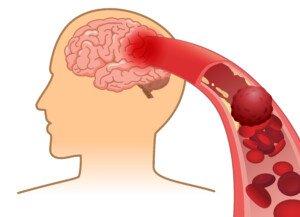
Stress increases stroke risk.
If you suffer from a lot of stress, then beware, as this is a risk factor for stroke, which strikes 700,000 Americans every year, the third leading medical cause of death in the U.S. Stress = stroke, essentially.
John M. Kennedy, MD., a cardiologist, explains: “The classic story from physiology textbooks describes how the human ‘stress response,’ also known as the ‘fight or flight’ response, is what enabled early man to survive as a species.
“The stress response, triggered by fear, stimulates a profound and sudden flooding of stress hormones, adrenaline and cortisol, into our bloodstream which cause dilated pupils, a racing heart, soaring blood pressure, and rapid breathing.
“These physiologic changes shift our body into overdrive, and prepare us to either fight or run for our life.
“Originally, this was a protective and adaptive response that helped us ward off meat-eating predators, and enabled us to survive.”

Shutterstock/tommaso79
The problem is that today’s crises don’t require a fight or flight response. Instead, modern man ends up immobile, unable to fight, unable to run, leap or jump. Instead, he remains inert and immobile.
1) Trapped in a traffic jam, late for work or an important appointment
2) Trapped in a stressful business meeting
3) Trapped in a cubicle at a dead-end job, or
4) Trapped in a stressful relationship.
A fight or flight means physical exertion that dispenses certain hormones that counteract stress hormones.
But inertia, sitting in the car cussing during that traffic jam, produces NO counteracting hormones. Thus, the stress hormones build up over time and damage the body.
“Today, the stress response is activated much more frequently and for many more mundane daily challenges,” says Dr. Kennedy, medical director of preventative cardiology and wellness at Marina del Rey Hospital, and author of the book, “THE 15-MINUTE HEART CURE: The Natural Way to Release Stress AndHeal Your Heart In Just Minutes A Day.”
“Getting stuck in traffic or waiting in line at Starbucks can lead to similar increases in stress hormones which over time can wreak havoc on our cardiovascular tissue.
“Externally, stress causes us to feel anxious, jittery, agitated, angry and depressed. Internally, stress causes a number of physiologic changes that increase our risk of heart attack and stroke which include:
“Increased inflammation; Elevated blood pressure; Increased heart rate; Increased platelets (blood corpuscles responsible for clotting); Increased fibrinogen (protein involved in blood clots).”
Together, these physiologic changes create the perfect storm for a cardiac event or stroke.
“And all of these physiologic changes increase atherosclerosis, the disease responsible for plaque formation on the walls of blood vessels.
“Eventually, these changes damage the delicate inner lining of the blood vessels and lead to a heart attack or stroke.”
Think of it this way: Thickened blood predisposes someone to stroke. That’s why people take “blood thinners” to lower risk of stroke.

Shutterstock/solar22
Thickened blood is more likely to clot, and a blood clot in the brain is what a stroke is. So why does our blood thicken when we are faced with stress and anxiety?
Our blood thickens to prepare the body for an anticipated wound! When facing a crisis, the body “thinks” it will either have to fight, or run for its life.
We evolved to get thicker blood in anticipation of a gash suffered in a fight with a wild animal, or during flight from a predator chasing us!
Thickened blood helps protect against bleeding to death from that gash or wound.
The fight or flight requires a physical exertion that produces hormones that neutralize the hormones that cause blood thickening.
However, modern man sits still during stress; no physical exertion to counteract stress hormones.
The result? The blood remains in a thickened, more “clottable” state on a chronic basis, and hence, increase of stroke!
 Double board certified in cardiovascular disease and also internal medicine, Dr. Kennedy’s special interest is stress and how it adversely affects a person’s delicate cardiovascular system.
Double board certified in cardiovascular disease and also internal medicine, Dr. Kennedy’s special interest is stress and how it adversely affects a person’s delicate cardiovascular system.
 Lorra Garrick has been covering medical, fitness and cybersecurity topics for many years, having written thousands of articles for print magazines and websites, including as a ghostwriter. She’s also a former ACE-certified personal trainer.
Lorra Garrick has been covering medical, fitness and cybersecurity topics for many years, having written thousands of articles for print magazines and websites, including as a ghostwriter. She’s also a former ACE-certified personal trainer.
.











